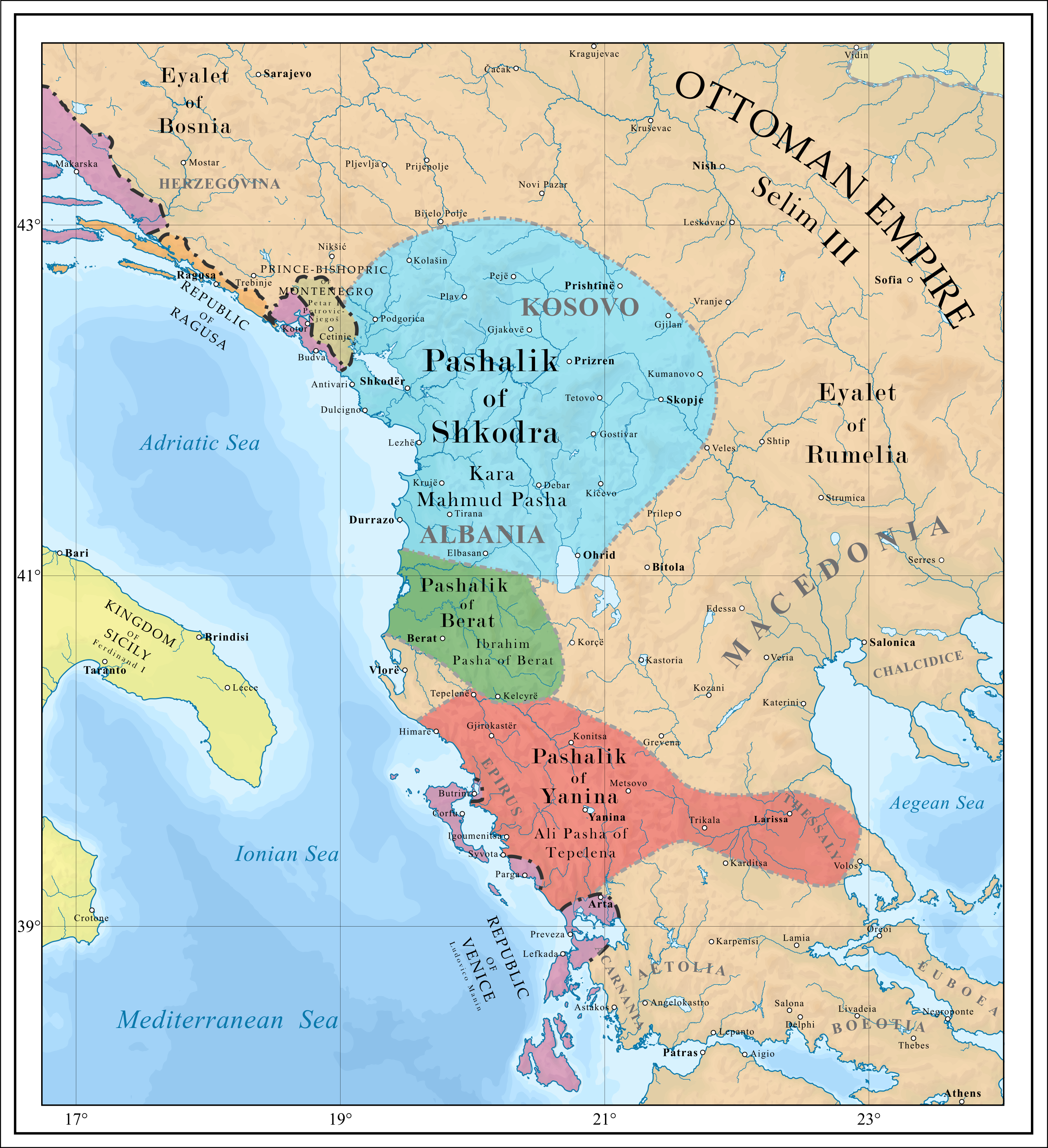Kara Mahmud Bushati on:
[Wikipedia]
[Google]
[Amazon]
 Kara Mahmud Pasha ( tr, Kara Mahmud Paşa,
Kara Mahmud Pasha ( tr, Kara Mahmud Paşa,
 Kara Mahmud Pasha ( tr, Kara Mahmud Paşa,
Kara Mahmud Pasha ( tr, Kara Mahmud Paşa, Albanian
Albanian may refer to:
*Pertaining to Albania in Southeast Europe; in particular:
**Albanians, an ethnic group native to the Balkans
**Albanian language
**Albanian culture
**Demographics of Albania, includes other ethnic groups within the country ...
: Mahmud Pashë Bushati, 1749–22 September 1796) was a hereditary Ottoman Albanian governor ('' mutasarrıf'') of the Pashalik of Scutari
The Pashalik of Scutari, Iskodra, or Shkodra (1757–1831), was an autonomous and ''de facto'' independent ''pashalik'' created by the Albanian Bushati family from the previous Sanjak of Scutari, which was situated around the city of Shkodër in ...
and de jure ruler of Albania, belonging to the Ottoman Albanian
Albanian may refer to:
*Pertaining to Albania in Southeast Europe; in particular:
**Albanians, an ethnic group native to the Balkans
**Albanian language
**Albanian culture
**Demographics of Albania, includes other ethnic groups within the country ...
Bushati family.
Life
Mahmud was the son of Mehmed Pasha Bushati, the governor of the pashalik of Scutari. When Mehmed Pasha died in June 1775, the Sultan's rule was not returned to northern Albania; he was succeeded by his young son, Mahmud Pasha. Other important families were the Rotul dynasty, which ruledPrizren
)
, settlement_type = Municipality and city
, image_skyline = Prizren Collage.jpg
, imagesize = 290px
, image_caption = View of Prizren
, image_alt = View of Prizren
, image_flag ...
from the 1770s to 1836, and the Gjinolli family whose members ruled Prishtina and Gjilan
Gjilan, or Gnjilane ( sr-cyr, Гњилане) is the eighth largest city in Kosovo and seat of Gjilan Municipality and Gjilan District.
Name
Ottoman chronicler Evliya Çelebi mentions ''Morava'' as a settlement of the Sanjak of Vučitrn. � ...
(Srb.: Gnjil-ane), becoming so powerful in the early nineteenth century that they were called the 'second rulers' of Kosovo after the Sultan. In the late eighteenth century, however, there was just one local dynasty that could rival - and did in fact openly challenge - the Sultan: the Bushati or Bushatli family of Shkodra.
'Old Mehmet’ Bushati became governor of the sancak of Shkodra (which included Pec) in 1757, and then gradually extended his rule over the whole of northern Albania. His ambitions of becoming an independent prince were cut short by his death in 1775, but his younger son Mahmut had similar plans;
In the 1780s his rebellious character brought him into conflict with the Ottomans. He conquered parts of Southern Albania and much of Kosovo Several times he campaigned in Kosovo: in 1795, for example, he took his army to Prizren
)
, settlement_type = Municipality and city
, image_skyline = Prizren Collage.jpg
, imagesize = 290px
, image_caption = View of Prizren
, image_alt = View of Prizren
, image_flag ...
, smashed the forces put up against him by the local Rotul dynasty, and installed his own nephew as governor of the town. The Catholic chronicler who recorded these events was enthusiastic in his praises of the man: 'I would go so far', he wrote, ‘as to compare him to a Maccabaeus, and even to the venerated Skanderbeg; if only he had been a Catholic, in my opinion he would have been the equal of either of them.' He modelled himself after Skanderbeg, and set up a 'Confederation of Illyria', based in Montenegro and called for both Albanians and Slavs for support
Archbishop Mazarek wrote that he was a just ruler, good to ‘Christians' and very active against robbers, and that his protection of the Christians was one of the things the Ottoman authorities held against him. Like other Catholics of this period, however, Mazarek used 'Christian' to mean ‘Catholic’ only, he also wrote that Mahmut ‘has taken countless purses of money from the Serbians, and has robbed them of all their possessions, food and livestock, and has taken the lot to Shkodra’'. And in general Mazarek observed that many of the civil wars between the various lords of Kosovo were stirred up by Mahmut Bushati, as part of a deliberate policy of divide and rule.
Mahmut's death in 1796 came just as he was embarking on his most ambitious plan of all: a conquest of much of the western Balkans as an independent ally of the revolutionary French army.
Aftermath
His brother Ibrahim Pasha continued to rule Scutari under the Ottoman sultan until his death in 1810. Ibrahim served as Beylerbey of Rumelia and played an important role on crushing the First Serbian Uprising led by Karađorđe.Legacy
*A northern Albanian folkloric song dealing with Mahmud Pasha's conflict with the Montenegrins is ''Kanga e Kara Mahmud Pashes Kundra Malazezve'' (The Song of Kara Mahmud Pasha against the Montenegrins).Annotations
*In Albanian he is known as Kara Mahmud Pashë Bushati. In Serbian, he is known as Mahmut-paša Bušatlija (Махмут-паша Бушатлија), or simply Kara-Mahmut (Кара-Махмут). Robert Elsie calls him by the Albanian neologism "Kara Mahmud Pasha Bushatlliu".References
Bibliography
* * * * * * * * * {{DEFAULTSORT:Bushati, Kara Year of birth missing 1796 deaths Executed Albanian people Albanian people executed abroad 18th-century Albanian people Kara Mahmud Albanian Pashas People executed by Montenegro by decapitation 18th-century executions Ottoman governors of Scutari People from Shkodër